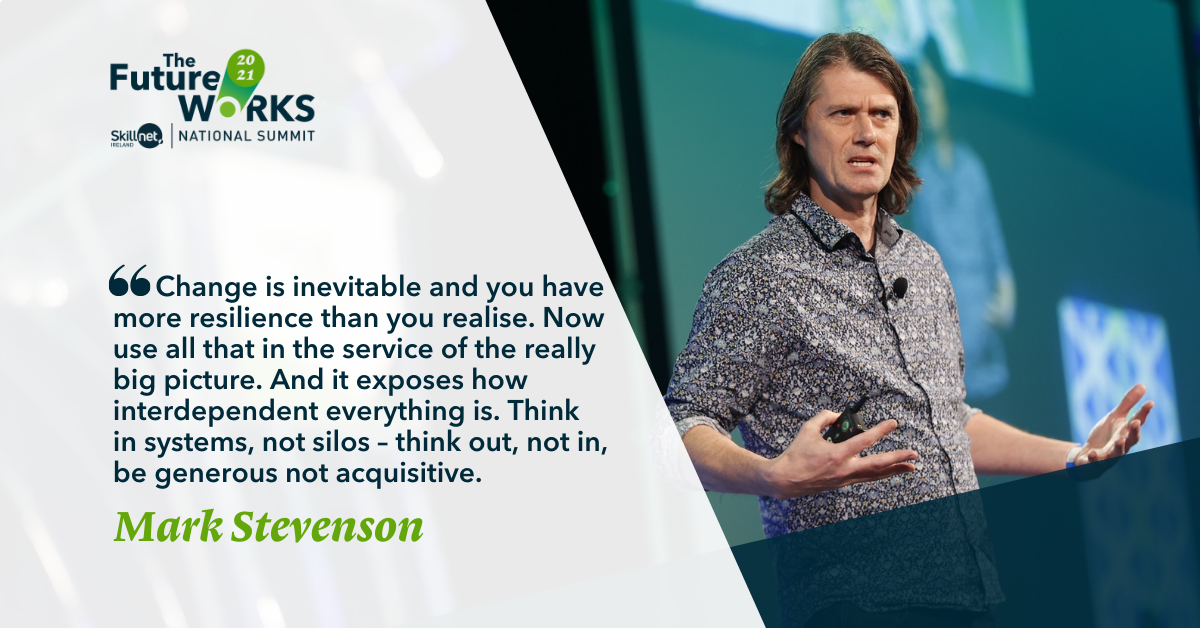As the world around us changes, so too is the world economy and our world of work. To delve into what this change means for business now and in the future, we recently spoke to renowned Futurist Mark Stevenson about the megatrends impacting businesses in 2022 and how to navigate them in the here and now.
1. Digital – Where should business leaders start on their digital transformation journey? Does it begin with a cultural shift?
It begins, as all journeys should, with a why – and if your ‘why’ is not actively making the future more sustainable, equitable, humane or just, then you and your technology should just stay at home. Your digital transformation journey is nothing without a soulful transformation first.
2. Climate change – As businesses contend with climate change and its impact on what they do, what positive and proactive steps can they take in developing talent for a new green economy?
Commit to becoming a regenerative business. Do not think that sticking plasters like dodgy carbon ‘offsets’ or little bits of corporate social responsibility or rebranding what you already do as ‘ESG’ are enough – they are the marks of a dead soul trying to stave off its inevitable requiem. If your business isn’t on the road to being regenerative it is part of the problem and within a generation will be legislated and competed out of existence.
3. Talent – How important is industry-government-academia collaboration in determining what the objectives of the current generation of talent are and should be for the future?
It’s essential that everyone is involved, but not in the way that everyone is looking for someone else to take the lead. Talk to everyone, but lead by example. So often we say we’ll wait to move when everyone else does – and so everyone stays put and blames their inactivity on that of others. All very comfortable, all very useless.
4. Innovation – You describe innovation as being the culture of asking the right questions. In practical terms, what does a successful innovation strategy look like for businesses?
In practical terms, it means innovating to make the world more sustainable, equitable, humane or just. It used to be that the weekend, ending slavery, public education and sewers were all ‘impossible’. So what is the new impossible and how are you going to deliver it. In practical terms, innovation means applying your talent to something that actually matters.
5. COVID-19 – What lessons can businesses and leaders learn from the COVID-19 pandemic?
That change is inevitable and you have more resilience than you realise. Now use all that in the service of the really big picture. And it exposes how interdependent everything is. Think in systems, not silos – think out, not in, be generous not acquisitive. As Peter Drucker said: “Profit for a company is like oxygen for a person. If you don’t have enough of it, you’re out of the game. But if you think your life is about breathing, you’re really missing something.”
6. Collaboration – Can you share examples where bottom-up diverse collaboration has been applied to good effect in industry sectors? Who are the leaders in adopting this principle and what can we learn from them?
The whole thing about diverse collaboration is that it’s across sectors. One of my favourite examples is http://www.participatorycity.org/ – a concept that focuses on co-creating an inclusive, collaborative and circular local economy through practical collaboration.
7. Opportunity from emergency – to fully embrace the upside of disruption caused by the long emergency, how do businesses need to think and act as they strategise for the future?
Your role is to do no harm. Then repair the damage done. The skills needed follow the moral philosophy required. Fall back in love with the future and build one you can be proud to pass to your descendants.
Develop your future-ready talent
As the national talent development agency, Skillnet Ireland is playing an advanced role in supporting businesses across Ireland from start-ups and SMEs to established multinationals and FDI companies to develop future-ready talent. Through our bespoke industry-led programme offering and 73 Skillnet Business Networks spanning industry sectors and regions, we are helping businesses and their people embrace digital transformation, prepare for the green economy, and enhance innovation through talent development. For more information on how to engage with us, see our range of Skillnet Business Networks.
Stay connected with Skillnet Ireland
Receive regular news and insights from the world of talent development straight to your inbox.
By adding my email, I agree to the use of my personal data in accordance with Skillnet Ireland Privacy Policy.



